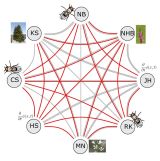- Back
- Location
- Anywhere
- Date Posted
- 12 May 2025

- Type
- PhD Project
- Anywhere
- 12 May 2025
PhD positions in SFB project ‘Polygenic Adaptation’

NOTE: this position listing has expired and may no longer be relevant!
Position Description
PhD positions are available within the Special Research Program (SFB) “Polygenic adaptation: from single selected loci to the infinitesimal model” in Vienna, Austria. Vienna is on top of the world’s most liveable cities and home to one of the largest communities of evolutionary research in Europe (www.evolVienna.at).
The SFB program is funded by the Austrian Science Fund (FWF) and brings together eight research groups at four institutions in and around Vienna with the common goal of elucidating the evolutionary genetics of adaptation of complex phenotypes: Neda Barghi, Robert Kofler, Christian Schlötterer (Vetmeduni); Joachim Hermisson, Himani Sachdeva (Univ. of Vienna); Magnus Nordborg, Kelly Swarts (Gregor Mendel Institute); Nick Barton (ISTA). For young scientists, this cluster offers a unique environment for interaction and personal growth.
The SFB aims to develop a framework for understanding polygenic adaptation and to establish new standards for the analysis of adaptive polygenic traits in GWAS and experimental evolution studies. We will combine model-based conceptual work and data-driven approaches from GWAS and experimental evolution to achieve this goal. The models and methods that will be developed integrate population genetic and quantitative genetic approaches to detect, analyze, and interpret genomic patterns of the “architecture of polygenic adaptation”.
PhD positions (3 years each; FWF salary € 2.464,80 before tax. Application deadline: June 04, 2023):
• 5 positions at Vetmeduni. Possible topics:
– Characterizing the adaptive architecture of polygenic traits (N. Barghi)
– Comparison of the genetic and adaptive architectures of polygenic traits (N. Barghi)
– Genomic and phenotypic patterns of adaptation in large experimentally evolved populations (N. Barghi)
– Understanding body size variation using experimental evolution (R. Kofler)
– Understanding polygenic adaptation with reduced genetic variation (C. Schlötterer)
– Characterizing the role of non-additive effects for adaptive responses (C. Schlötterer)
– The role of genotype x environment interactions for adaptive responses (C. Schlötterer)


